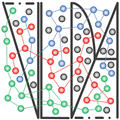TROTWET has nothing to with trotting or wetness. It stands for “The Rule Of The WEaker Tool,” and is a principle for resolving conflicts of laws in voluntary law societies. It arises from the fundamental need to resolve conflicts between different laws, within societies in which each person is granted the sovereign power and responsibility to make, adopt, and publish her own laws. TROTWET provides a basis for determining which law should be applied in any given conflict in such societies, based principally on the laws adopted by each party, and (in some cases) the respective times the different laws were publicly adopted.
TROTWET or any other universal rule of conflict resolution is not required for voluntary law to function, but without universal rules for resolving conflicts between personally adopted laws, voluntary law societies will be segregated into isolated communities between which no voluntary law can operate. It is a universal rule for resolving differences between laws that permits voluntary law societies to freely intermingle, and grow to displace the state. TROTWET is perhaps the only non-arbitrary principle that provides fairly balanced incentives to all who make or adopt their own laws. It is a principle for resolving conflicts between laws, which is designed to prevent any from being judged under a law harsher than their own, and to prevent any who adopt lesser penalties from exploiting the laws of those who have adopted more severe penalties.
TROTWET is applicable to at least four types of laws: positive laws that proscribe some remedy based on misconduct of another, affirmative defenses to positive laws, due process rules, and laws governing legitimacy of ownership claims. The application of TROTWET differs based on the type of law being considered. For positive laws, the weaker tool is that law which results in the lightest penalty imposed on the defendant. The claimant wields the positive law, and the weaker tool is that which provides the least for the one that wields it. For affirmative defenses, the weaker tool is that which results in the greatest penalties on the defendant, because it is the defendant that wields affirmative defenses. For due process rules, the weaker tool is the set of process rules that is most burdensome for the claimant to follow. For different laws brought to decide between claimants to the same property, the weaker tool is that which requires the most work, per unit of property, to establish the right of ownership.
Under voluntary law, each person has the right and responsibility to make and adopt their own laws, and lacks any power to impose any law on another. TROTWET emerges naturally from this premise of voluntary law. Absent some other voluntary arrangement between the parties to a legal conflict, it is necessary to choose the “weaker tool” to prevent one party from imposing harsher legal penalties on another, than the other person’s adopted law allows. In other words, the “weaker tool” may be defined as that rule that prevents the impermissible imposition of non-adopted legal penalties on another, even if this would deprive claimants of the remedy that they are willing to accept for themselves.
Time enters the TROTWET analysis when a party to a conflict has changed their law in the past. To the extent that time of the change creates any ambiguity regarding which of their laws is operative for the conflict at had, that ambiguity is construed against them. The party that has changed will be held to the least favorable law of the laws they have adopted, in that case.
TROTWET supplies the power of a “virtuous circle” to the practice of voluntary law. It ensures that weaker, less demanding laws are those that will be applied in any given conflict. Laws that are too weak, however, deprive their adopters of reasonable legal remedies and leave them more susceptible to unpleasant extra-legal abuses. Everybody, therefore, is supplied with motivation to choose laws that provide for the least onerous penalties that they can reasonably accept as both just and sufficiently deterring of anti-social conduct. In addition, to reduce uncertainty over applicable law, many people will be motivated to adopt the most popular laws, so long as reasonably compatible with their deeply held beliefs about justice. These social pressures should cause voluntary laws to coalesce, over time, into a relatively small and manageable number of strands. This coalescing should, in turn, inspire confidence in voluntary law and encourage its adoption.
Weaker tool analysis is not without problems. For example, in some proportion of cases, it will be difficult to reliably predict which law is the weaker tool. One jurist may pick the first law, and another equally wise and well-regarded, the second. Consider, however, that such uncertainty will arise only in cases wherein the penalties or burdens are comparable, and thus difficult to distinguish in magnitude. The errors in either direction will therefore necessarily be minor, and the law of averages will bring highly accurate results on the whole. TROTWET might also be criticized as allowing defendants to choose their subjectively favored penalties. For example, wealthy people may favor monetary damages that they can pay with relative ease, while the poor and destitute may prefer a period of indentured servitude in which they might learn a new skill. How are these different preferences to be weighed, to determine the weaker tool? There can be no predetermined solution, for such determinations must lay in the hands of free and independent jurists. Let the schemers tempt with crafty laws these free jurists, whose livelihoods depend on their reputations for justice, if they dare.
While it cannot be predicted exactly how TROTWET will play out in every case, it can easily be learned by experiment. The basic principles are simple enough for a 10-year-old child to understand and apply. Such children can likewise easily understand the consequences of choosing penalties or processes that are either too trivial, or too onerous. It will be those children who devise the laws of the future, who will amaze their parents with their creativity and justice. Therein lies the true power of this unifying rule.
To read more about TROTWET, see this essay about TROTWET as applied to positive laws and affirmative defenses, and this essay about TROTWET as applied to laws for determining property rights and this essay about TROTWET as applied to due process rules.
* * *
“That’s Wet” by Andreas Adelmann
Some rights reserved under Creative Commons Attribution-NonCommercial-NoDerivs 2.0 Generic (CC BY-NC-ND 2.0)

